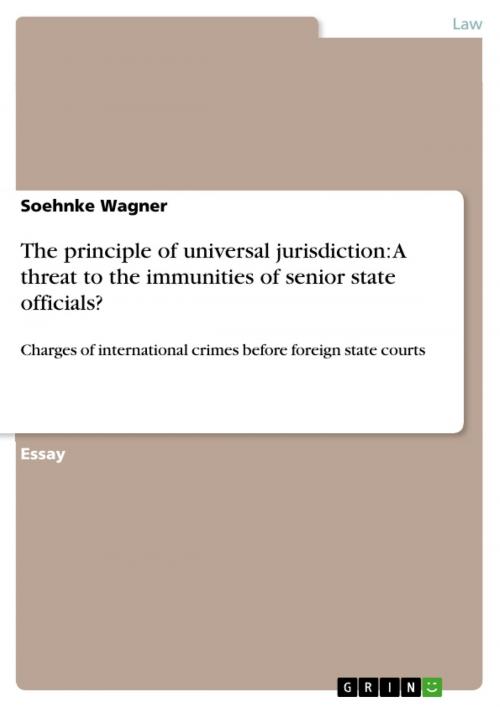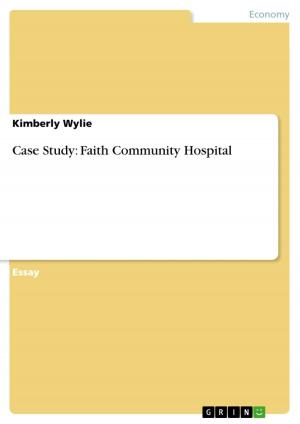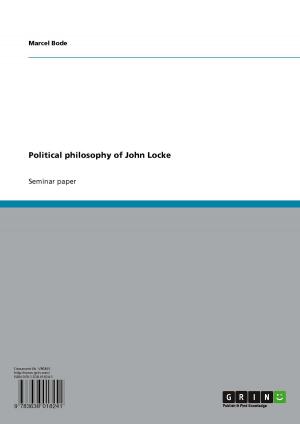The principle of universal jurisdiction: A threat to the immunities of senior state officials?
Charges of international crimes before foreign state courts
Nonfiction, Reference & Language, Law, International| Author: | Soehnke Wagner | ISBN: | 9783640675463 |
| Publisher: | GRIN Publishing | Publication: | August 3, 2010 |
| Imprint: | GRIN Publishing | Language: | English |
| Author: | Soehnke Wagner |
| ISBN: | 9783640675463 |
| Publisher: | GRIN Publishing |
| Publication: | August 3, 2010 |
| Imprint: | GRIN Publishing |
| Language: | English |
Essay from the year 2007 in the subject Law - European and International Law, Intellectual Properties, grade: 1,0, University of Bremen (Fachbereich Rechtswissenschaft), course: International Public Law, language: English, abstract: Following from the general principle of international law imposing respect for the sovereignty of foreign states, senior state officials, as state organs, traditionally are subject to the jurisdiction of their home state only. It became customary law that state officials enjoy immunity of the jurisdiction of foreign states for acts performed in their official capacity, irrespective of the place where the action took place or the persons who were affected by it. In correspondence to the privileges of diplomatic agents, as declared in the Vienna Convention on Diplomatic Relations of 1961, these immunities apply even to private acts. When it comes to criminal proceedings, traditionally the territoriality principle has to be respected. Especially in cases of international crimes, which in many cases are performed by high ranking state officials, it is often not possible, though, that the trial takes place in either the home state of the accused or the country where the crime took place. The reason may be a lack of political will to prosecute, a national legal system not capable of carrying out an investigation and prosecution, amnesties granted to the accused for their crimes, or the chance that the accused may not receive a fair trial in the country in question. Prosecution of the committers of the most severe crimes such as genocide, war crimes or crimes against humanity consequently proves difficult. Modern international law tries to provide for less strict rules in respect to the jurisdiction. Next to jurisdiction of international courts the principle of universal jurisdiction hereby plays an important role. To prosecute state officials responsible for international crimes before a court of a foreign state however seems to contradict the immunities that are granted to the officials by international law. This paper examines the scope and the practical relevance of the concept of universal jurisdiction and analyses its compatibility with senior state officials' immunities, thereby taking reference to national and international jurisprudence.
Essay from the year 2007 in the subject Law - European and International Law, Intellectual Properties, grade: 1,0, University of Bremen (Fachbereich Rechtswissenschaft), course: International Public Law, language: English, abstract: Following from the general principle of international law imposing respect for the sovereignty of foreign states, senior state officials, as state organs, traditionally are subject to the jurisdiction of their home state only. It became customary law that state officials enjoy immunity of the jurisdiction of foreign states for acts performed in their official capacity, irrespective of the place where the action took place or the persons who were affected by it. In correspondence to the privileges of diplomatic agents, as declared in the Vienna Convention on Diplomatic Relations of 1961, these immunities apply even to private acts. When it comes to criminal proceedings, traditionally the territoriality principle has to be respected. Especially in cases of international crimes, which in many cases are performed by high ranking state officials, it is often not possible, though, that the trial takes place in either the home state of the accused or the country where the crime took place. The reason may be a lack of political will to prosecute, a national legal system not capable of carrying out an investigation and prosecution, amnesties granted to the accused for their crimes, or the chance that the accused may not receive a fair trial in the country in question. Prosecution of the committers of the most severe crimes such as genocide, war crimes or crimes against humanity consequently proves difficult. Modern international law tries to provide for less strict rules in respect to the jurisdiction. Next to jurisdiction of international courts the principle of universal jurisdiction hereby plays an important role. To prosecute state officials responsible for international crimes before a court of a foreign state however seems to contradict the immunities that are granted to the officials by international law. This paper examines the scope and the practical relevance of the concept of universal jurisdiction and analyses its compatibility with senior state officials' immunities, thereby taking reference to national and international jurisprudence.















